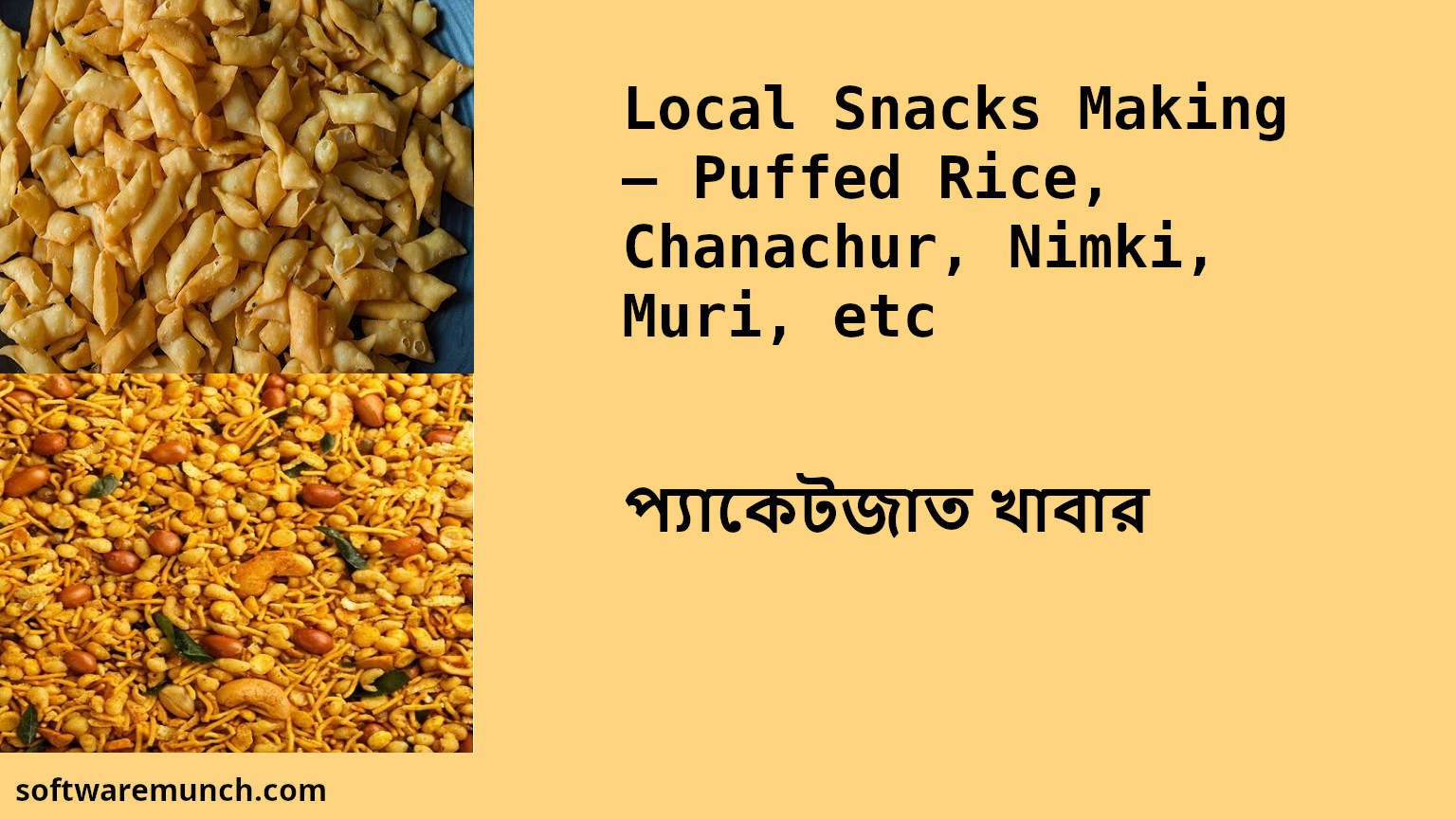In every town and village, people love to munch on local snacks. In the evening, when people sit in the tea shop, they want something light like muri, nimki or chanachur, bhujia etc. During festivals, weddings and even daily life, these snacks are always in demand. That is why starting a local snacks making business can be a good income source for rural families. It does not need too much money and the work can be started from home.
Why Local Snacks business is a Good idea
Snacks like puffed rice (muri), chanachur, nimki and other fried or roasted items are very popular in Assam, Bengal, Bihar, Odisha and almost all parts of India. These are low cost products, but people buy them again and again. If the quality is good and the taste is fresh, customers will always come back.
Also making snacks is not very difficult. With little training and the right ingredients, you can prepare them at home or in a small workshop. The business can grow slowly into a big one if more people in the family get involved and there is a proper demand.
Investment Needed
Starting this business does not require very big money.
- with Rs20000 to Rs50k you can start from home.
- You will need big utensils, frying pans ( kadai) a stove (gas or coal), and basic tools like sieves and storage tins.
- for packing, you need plastic packets or paper pouches, sealing machine and labels etc.
- For puffed rice if you want to produce in large quantity, you may need a small puffing machine, which costs a little more. But in villages, you can also buy muri from local puffed rice makers and then mix masala to make flavored muri or jhal muri or even bhel puri.
How to Learn Snack making
Most snacks like nimki and chanachur can be learned easily at home. Mothers and grandmothers already know the recipes. But if you want to sell in the market, you must learn how to make in larger quantity and how to keep the taste same every day.
Ways to learn:
- work for a few months with a local sweet shop or snack seller.
- Join a short food processing training organized by government schemes like KVIC (Khadi and Village industries Commission) or MSME training centres they may not teach the recipes but they will teach packaging , planning and other business related things.
- Many times, NGOs and women self-help groups (SHGs) also give training on food processing.
With practice, you will learn how to fry properly, how to mix spices and how to pack so the food remains fresh.
Procuring the Raw materials
The main items required are:
- Rice for puffed rice ( muri)
- flour (maida and atta) for nimki
- Peanuts, chana, sev, dal for chanachur
- Spices and salt for taste
- Oil for frying
All these are easily available in the local mandi or wholesale market. Buying in bulk will save money. For puffed rice, you can tie up with a local rice mill or puffing unit. For other items, you can buy from Guwahati, Silchar or other big city wholesalers in Assam.
Making and Preserving the snacks
Snacks must be fresh and crisp otherwise customers will not like them.
- Muri (puffed rice) – keep it in a dry tin or plastic drum with tight lid. Do not allow moisture. Add masala only before selling otherwise it will get soggy.
- Nimki – Fry properly on medium flame. Half fried nimki will absorb oil and spoil fast. Store in airtight containers.
- chanachur – Mix fried sev, peanuts, chana, and masala. Pack in sealed packets quickly otherwise the crispness goes away.
- Other fried snacks – Must be kept in clean and dry place. Always use fresh oil for frying.
During rainy season, snacks spoil faster. So, prepare in smaller batches and pack immediately.
Selling the Snacks
There are many ways to sell:
- Directly from home shop or small stall in bazaar.
- supplying to local tea stalls, kirana shops and eateries.
- Packing in small pouches of Rs5, Rs 10, Rs20 and selling in schools, small towns, or weekly haats.
- For festivals or functions, you can take bulk orders.
If quality is good, people will spread the word and sales will grow. You can also keep your name printed on the packet, so customers remember.
Licenses and Permission
If you sell on a very small scale, no license is needed in the beginning. But for bigger sales, you must register under FSSAI (Food Safety and standards Authority of India). Small scale registration is cheap and easy. You may also register your business under MSME for future government benefits.
Challenges in the Snack Business
- Maintaining same taste and quality every day.
- keeping the snacks crispy during rainy season.
- Competition from branded snacks like Haldiram or packaged chips.
- Finding good market in the beginning.
But these problems can be solved with practice and good packaging.
Success Story Example
Let us take an example. Laisharam Devi from jirighat, Assam started making nimki and chanachur from her home kitchen. At first, she sold only in her village tea stalls. Slowly her products became popular. She bought a sealing machine and started printing her shop’s name. Now, her snacks are sold in nearby towns like silchar also. She earns steady income and has employed two other women.
This shows that with patience and good quality, local snacks can become a strong business.
Last words
Snacks like muri, nimki and chanachur are part of daily life in rural and semi urban areas. People will always buy them because they are tasty, cheap and filling. With low investment, a family can start this business from home and later expand with better machines, packing and bigger markets. For rural entrepreneurs, this is a strong and simple path to regular income.
